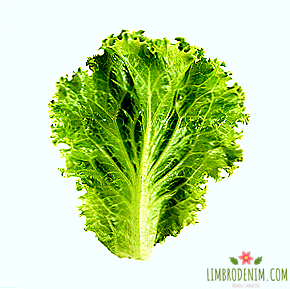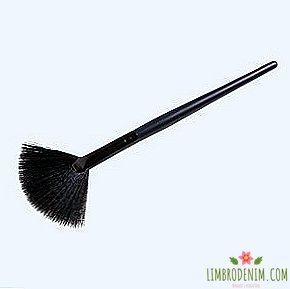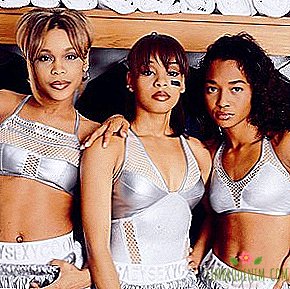Art critic and curator Sasha Obukhova about favorite books
IN BACKGROUND "BOOK SHELF" we ask heroines about their literary preferences and editions, which occupy an important place in the bookcase. Today, art critic and curator of the archive of the Garage Museum of Contemporary Art Sasha Obukhova talks about favorite books.
INTERVIEW: Alice Taiga
PHOTO: Alyona Ermishina
MAKEUP: Anastasia Dziuba

Sasha Obukhova
art historian and curator
As my mother, far from my professional studies, says: “Yes, it’s not for nothing that you loved Kharms as a child!”
 All my children's textual hobbies were rather “holes”, where you could run away and hide from reality - you could live there, completing the text at your discretion. We had a very large library at home, and my classmates often went to us for books. At school I constantly recited what I had read and, as it turned out, I thought about some chapters as the author. Friends then read and said: "What you told, I did not find there! Where did you get this plot twist?"
All my children's textual hobbies were rather “holes”, where you could run away and hide from reality - you could live there, completing the text at your discretion. We had a very large library at home, and my classmates often went to us for books. At school I constantly recited what I had read and, as it turned out, I thought about some chapters as the author. Friends then read and said: "What you told, I did not find there! Where did you get this plot twist?"
As my mother, far from my professional studies, says: “Yes, it’s not for nothing that you loved Kharms as a child!” Ivan Toporyshkin, of course, played a role: I saw the brokenness of reality, I learned that it can be reformatted to your taste. The Kharms method helped me to “rearrange” reality, although I discovered Harms as a great writer much later. I remember that in my school there was a group of girlfriends with whom we deliberately changed the stress in the words: we spoke in such a way as to say each word incorrectly - this was our joint exercise on breaking dox.
In this work, I started from the art itself: I studied at an art school, but I understood quite early that I would be a bad artist because I could not see the world as a whole. Later, I remembered this discovery, when I watched Ilya Kabakov's album “The Anguish of Surikov”: the character there also saw only fragments of the world. In art school I understood the second important thing for me - that the world as a painting is more important to me than the world as a text - and went to study at the art historian.
I find it difficult with modern literature. Attempting to read some newborn text constantly leads to severe disappointment. I just can't, I'm crying. I have the same severe reaction to bad exhibitions: I am physically ill from them. With texts it is even worse, especially with translations: some hellish lies are climbing out of the new ones. This, apparently, is connected with the existential trauma of a new generation of translators who are not sure of anything and therefore cannot really take the liberty to accurately translate even a word. They start to wriggle, make footnotes, try to be close to the meanings of the language they are translating from. But the Russian language does not feel at all.
Now I can only read what I need for work, and these texts quench my thirst for other stories that do not relate to my life and bring someone else’s perception of the world into it. To date, I have made about thirty books, not as an author, but as an editor-compiler: in the process of reading, listening and composing the text become a single task.
There is a paradox that I can’t fully comprehend: where the time has gone. Previously, it was enough for work and reading for the soul, but social networks seemed to be eaten. Now in my life a lot of random reading, but a little concentrated. Therefore, if there is a need to read carefully, I choose only what I really need. And thank God, this is an excellent material: memoirs, criticism, interviews. Now I find it difficult to untie projects and leisure reading. As one of my not so beloved employer once said: “Why pay you a salary? I give you the opportunity to do what you love!”
I have a severe reaction to bad exhibitions: I am not physically good from them

Fedor Dostoevsky
"Crime and Punishment"
“Crime and Punishment” I read early, and it absolutely shocked me. Such "getting used to" the text when you are experiencing not only the plot, but also the letters themselves. The teacher taught me to see structure in the text. It was on this book that I had, as I would say now, the will to interpret. With "Crime and Punishment" began the story of my relationship with the text - as with something external and at the same time clearly structured, a succession of contexts. I think that all the following book impressions were connected with this discovery - that you can interact with the text on different "floors".
Dostoevsky is still infinitely dear to me, despite my current objections to his ideological positions. I can not forget his "oval-shaped round table". There are literary deliberations, to which I have lost interest, but Dostoevsky's “raising half the imperial” from the floor is mine. This is how I say, willy-nilly, how I watch my own life become text when I distance myself from it in time.
Nikolay Chernyshevsky
"What to do?"
Another book that influenced me, which I cannot but remember, although it is ridiculous to talk about it now, was the novel “What to do?”. Recently, I reached out to him before our interview - God, now it is simply impossible to read! I threw in the middle. At the same time, I still meet young people who are guided by this text as an important source for ethical growth.
Anyone who has read Chernyshevsky, I ask: "What did you read first -„ The Gift “of Nabokov, or„ What to do? “Chernyshevsky?" I first Chernyshevsky, and then Nabokov: the second one, when I was fourteen years old, was impossible to get in Moscow - my parents were not in the circle of Tamizdat fans. I already read the “gift” at the university, and he took down all my previous addictions. But in my character, all the same, what I took from Chernyshevsky remained - such a Komsomol, post-Tolstoy ethical maximalism. Pretty totalitarian, I must say.
"Library of World Literature": "Russian Poetry of the Early 20th Century", "Western European Poetry of the 20th Century"
If we talk about my interest in the formal interpretation of poetic texts, I learned this from the poetry of modernism. Immediately after it, it was easy for me to feel the aesthetics of Moscow conceptualism and other art, to which most people did not prepare. It was an instant acceptance.
Peter Burger
"Theory of the avant-garde"
There is a story that brought this book to my shelf. In 1992, the then director of the Houston Museum of Modern Art, a Greek by origin, George Heritas, arrived in Moscow. He arrived, like many foreigners then, on a wave of interest in a renewed Russia, which rose from nothing, from the ruins of the Soviet Union. Iosif Bakshtein called me and said: "Sasha, an American came here, and I have no time to mess with him, could you take it over? Take him to the exhibitions, to the workshops." I said, of course. Introduced him to the conceptualists, took him to the gallery in Trekhprudnom, to young artists. And this noisy young company turned out to be much more interesting for him than artists from the non-conformist establishment.
Before leaving, Heritas invited me to his hotel "Belgrade" at Smolensk, said: "Fear of the Danites, gifts that bring!" And he gave me a huge bag, where there were warm shoes for Anatoly Osmolovsky, a bottle of Cuban rum with Fidel Castro on the label and a new cashmere sweater. I also got a stack of books related to the theory and history of modern art. Then George sent a parcel with new books from America - we called him "Santa Claus Communist" because he was a leftist, as is customary in the intellectual environment of Americans of that generation. In general, it was he who provided us with the literature that we enthusiastically flipped through when we celebrated the New Year and drank rum.
Ivan Efremov
The Hour of the Bull
This book has long been irrelevant to me, but there are ideas in it that at one time replaced Tolstoyan post-Christian morality. Efremov created an ethical and poetic ideal of a world where there is happiness for all, an idea of a world where it is impossible not to work. The ethics of unselfish labor for the common good - at some point I had a serious fixation on this. However, this book can be easily replaced by the Strugatsky favorite thing "Monday begins on Saturday."
Anton Chekhov
"Three years"
Chekhov doesn’t unfold in my early and late periods - I just love everything he wrote. Our family had a complete work, including letters - I could read from the first volume to the last, and then begin again. His evil, very caustic mind combined with endless love for people is such a surgical toolbox with which he mercilessly cuts this world, while pitying it. This is probably the most important thing for me in his talent, and it does not matter whether what is written is about early stories or late dramas. But still, I guess I have a favorite text of it - this is “Three years”. My essential Chekhov.
Rosalind krauss
Articles
Rosalind Krauss is a correspondence teacher whose texts I always want to return to. In her texts there is something that is not in the works of most art critics: a very tough theoretical position, methodological rigor. At the same time, she does not neglect historical knowledge in any of the texts, but, on the contrary, insists on it. This is what I would like to achieve in the lyrics myself. Maybe that's why I rarely write and write a little - because I do not see in myself the ability to combine historical knowledge and the strict methodological grid on which it fits. For me, Rosalind Krauss is an example of scientific rigor and revolutionary methodological courage.
Gospel
There is a book that I will never be able to live completely - every time it turns my worldview, depending on what I feel now, although this state is actually somewhere nearby all the time. Although I am an unbaptized and not very religious person, the text of the Gospel for me is an eternal shock.
Yve-alain bois
"Painting as Model"
The book I bought when I worked in New York in 1994. When I read it, apparently, I was in a hell of anguish, because I could not get rid of the sensations of her heavy hermeneutic language. This book is a reminder of how often even the most complex texts become part of our everyday life. I will always remember how I spent these five months in New York, working, reading and remembering Moscow all the time, because my love remained there. Such a romantic longing in combination with a new philosophy.
Graham green
"The End of One Novel"
A love story where god defeated human passion. This is a delicate work that is valuable to me not so much by the plot as by the special voice of the translator - Natalia Leonidovna Trauberg. She is for me a sample of translation skills, with a very distinct position, when the translator does not hide behind the author, but manifests herself in literary passions and in the language. It is no coincidence that I meet such reviews of her translations, where they are considered better than the original. Her theological, say, biblical attitude to the text and morality covers the entire narrative with a shining veil. And the Russian text is read as absolutely unearthly crystal sounds.




